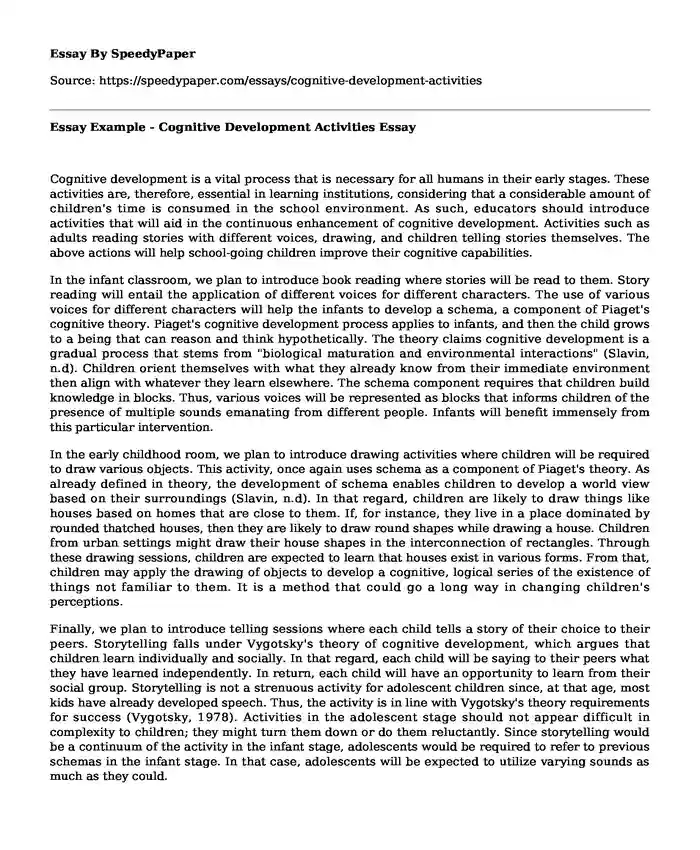
| Type of paper: | Essay |
| Categories: | Teaching Learning Child development Cognitive development Essays by pagecount |
| Pages: | 3 |
| Wordcount: | 646 words |
Cognitive development is a vital process that is necessary for all humans in their early stages. These activities are, therefore, essential in learning institutions, considering that a considerable amount of children's time is consumed in the school environment. As such, educators should introduce activities that will aid in the continuous enhancement of cognitive development. Activities such as adults reading stories with different voices, drawing, and children telling stories themselves. The above actions will help school-going children improve their cognitive capabilities.
In the infant classroom, we plan to introduce book reading where stories will be read to them. Story reading will entail the application of different voices for different characters. The use of various voices for different characters will help the infants to develop a schema, a component of Piaget's cognitive theory. Piaget's cognitive development process applies to infants, and then the child grows to a being that can reason and think hypothetically. The theory claims cognitive development is a gradual process that stems from "biological maturation and environmental interactions" (Slavin, n.d). Children orient themselves with what they already know from their immediate environment then align with whatever they learn elsewhere. The schema component requires that children build knowledge in blocks. Thus, various voices will be represented as blocks that informs children of the presence of multiple sounds emanating from different people. Infants will benefit immensely from this particular intervention.
In the early childhood room, we plan to introduce drawing activities where children will be required to draw various objects. This activity, once again uses schema as a component of Piaget's theory. As already defined in theory, the development of schema enables children to develop a world view based on their surroundings (Slavin, n.d). In that regard, children are likely to draw things like houses based on homes that are close to them. If, for instance, they live in a place dominated by rounded thatched houses, then they are likely to draw round shapes while drawing a house. Children from urban settings might draw their house shapes in the interconnection of rectangles. Through these drawing sessions, children are expected to learn that houses exist in various forms. From that, children may apply the drawing of objects to develop a cognitive, logical series of the existence of things not familiar to them. It is a method that could go a long way in changing children's perceptions.
Finally, we plan to introduce telling sessions where each child tells a story of their choice to their peers. Storytelling falls under Vygotsky's theory of cognitive development, which argues that children learn individually and socially. In that regard, each child will be saying to their peers what they have learned independently. In return, each child will have an opportunity to learn from their social group. Storytelling is not a strenuous activity for adolescent children since, at that age, most kids have already developed speech. Thus, the activity is in line with Vygotsky's theory requirements for success (Vygotsky, 1978). Activities in the adolescent stage should not appear difficult in complexity to children; they might turn them down or do them reluctantly. Since storytelling would be a continuum of the activity in the infant stage, adolescents would be required to refer to previous schemas in the infant stage. In that case, adolescents will be expected to utilize varying sounds as much as they could.
In conclusion, cognitive development is a process that could be improved by applying particular activities in various stages through a child's development stages. Considering that children are mostly in schools during their early stages, such actions could work well in learning institutions. Activities targeting cognitive development should be applied to the particular developmental stages of a child. Various activities are age or stage-specific.
References
Slavin, R.E. (n.d). Educational Psychology: Classroom Application of Vygotsky’s Theory.
https://wps.ablongman.com/ab_slavin_edpsych_8/38/9951/2547615.cw/index.html
Vygotsky, L. S. (1978). Mind and society: The development of higher mental processes. Cambridge: Harvard University Press.
Cite this page
Essay Example - Cognitive Development Activities. (2023, Sep 14). Retrieved from https://speedypaper.net/essays/cognitive-development-activities
Request Removal
If you are the original author of this essay and no longer wish to have it published on the SpeedyPaper website, please click below to request its removal:
- Free Essay Example about Ethics in Medicine
- Child Labor Essay Samples
- Pollution in Iran - Thomas Erdbrinks' Article Essay Sample
- Essay Example: Frantz Fanon's CV
- Free Essay Example about Financing of Health Care
- High Blood Pressure among Hispanic Adults
- Essay Sample: Cultural Capital and Cultural Appropriation
Popular categories




